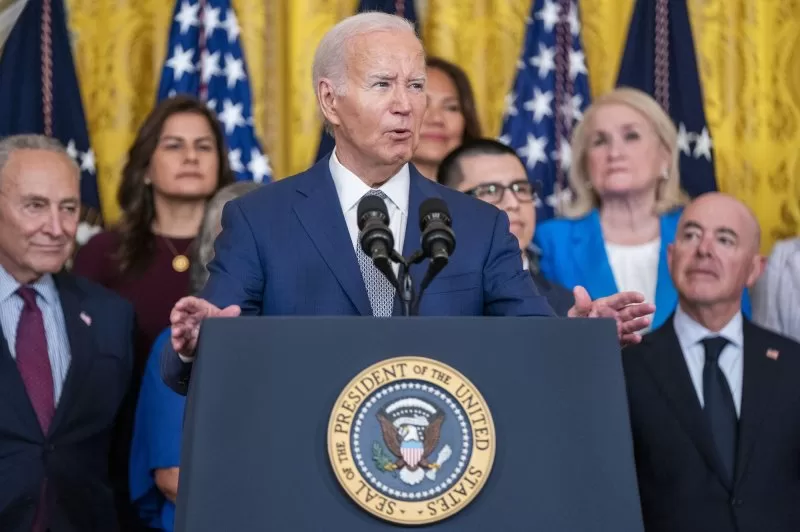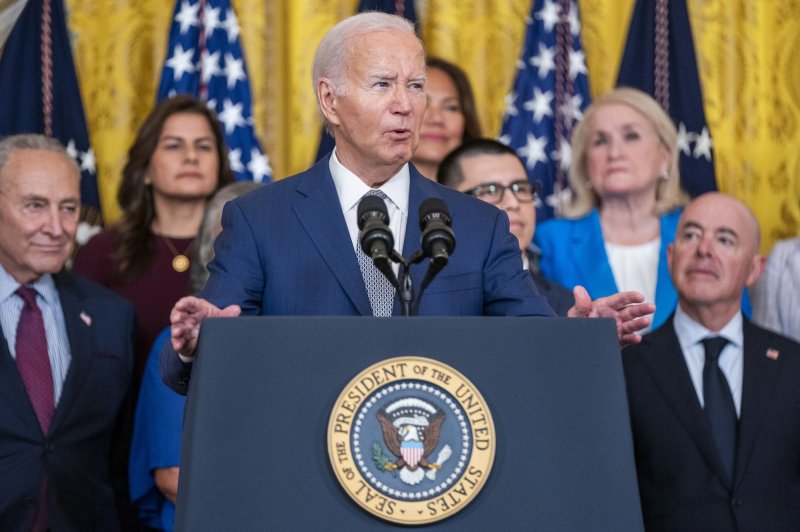President Joe Biden delivers remarks during the DACA 12th Anniversary event in the East room of the White House in Washington, D.C., on Tuesday. Photo by Shawn Thew/UPI |
License PhotoJune 20 (UPI) — The Deferred Action for Childhood Arrivals program turned 12 years old on Saturday but concern looms over the celebrations.
President Joe Biden said in a statement to mark the 12th anniversary that 800,000 Dreamers have been granted protections under DACA. He also reiterated his intentions to reform U.S. immigration policy in a way that protects the rights of Dreamers, while on Tuesday announcing new action to speed up the work visa process for DACA recipients who have graduated with a degree from an accredited higher learning institution and received a job offer from a U.S. employer in a related field.
Meanwhile, DACA remains virtually frozen while the Fifth Circuit Court of Appeals mulls a lawsuit that challenges whether the executive branch has the authority to create such a consequential program. Judge Andrew Hanen of the southern district of Texas ruled in 2021 that President Barack Obama exceeded his authority when creating the program.
A federal appeals court agreed when it made its ruling in October but kept the program intact while a lower court considers a regulatory change made by Biden.
“DACA, to be very clear, still remains at risk,” Carlos Guevara, director of policy at The Immigration Hub told UPI. “We’re facing a big Supreme Court decision, probably around this time next year, if this case makes its way up to the court. There is going to be a lot of work to build a case around DACA legislatively.”
The Obama administration enacted DACA by presidential memo in 2012. Individuals who have maintained residency in the United States continuously and were 16 years old by June 15, 2007 were declared eligible to seek protections under the program.
Because DACA was implemented via memo, the Biden administration took a step to re-establish it on firmer footing. In 2022 he introduced the final rule on DACA, unveiling regulations in the Federal Register to codify the program in a formal rulemaking process.
While little about the program actually changed, this acted as a retort to legal challenges initially launched in 2017.
The Biden administration temporarily reopened the DACA application process before Judge Hanen ruled the program illegal in 2021. Several thousand applications were accepted but have not been processed due to the ruling that quickly followed.
Rep. Delia Ramirez, D-Ill., authored an op-ed in the Chicago Sun Times last week calling on Biden to do more for Dreamers. She and more than 60 other members of Congress proposed that the Biden administration modernize the program and increase access to work permits.
“Over the past 12 years, DACA has allowed young people to live, work, and thrive in the only country they have called home. As you know, the Fifth Circuit Court of Appeals will almost certainly rule DACA as unlawful, given its previous rulings against immigrant youth, sending the program once again to the U.S. Supreme Court,” House members wrote in a statement.
“The rollercoaster of legal uncertainty around DACA is destabilizing and traumatizing, as our immigrant communities deserve to be safe, free from the extreme stress and fear that comes with the threat of deportation, and able to plan their futures.”
The presidential election in November presents another potential threat to DACA.
Julia Gelatt, associate director of the Migration Policy Institute’s U.S. Immigration Policy Program, told UPI a second term under former President Donald Trump could spell the end of the program.
During his first year as president, Trump attempted to cut the program while using it as leverage to build a wall along the southern border.
“We know he tried to end DACA last time and was blocked from fully ending it,” she said. “He may have a new strategy. There are a lot of different threats to the program on the horizon.”
Trump’s attempt to terminate the program was shot down by the Supreme Court in a 5-4 ruling. Chief Justice John Roberts wrote that it “infringed on the equal protection guarantee of the Fifth Amendment’s Due Process Clause.” He added that the Department of Homeland Security did not adequately explain its reasoning for ending the program.
Immigrants have been a common target of Trump as he has campaigned for the presidency. He has continued his unfounded claims that immigrants crossing the southern border are criminals and from “mental institutions,” among other derogatory remarks. This, along with his past actions against DACA, has advocates concerned he will make another effort to end the program if elected.
When Obama announced DACA, he likely saw it as a temporary solution while Congress sought larger immigration reforms, according to Gelatt. This is why there were some limitations written into the policy that are based on seemingly arbitrary dates and ages, such as the requirement that applicants must have been 16 years old by June 15, 2007 to qualify.
“If the Obama administration would have realized it would have to endure the next 12 years they would have created broader eligibility criteria,” Gelatt said.
Elizabeth Taufa, policy attorney and specialist with the Immigrant Legal Resource Center, told UPI that the Biden administration had the opportunity to expand DACA eligibility with its final rule in 2022 but declined to do so.
“It’s a temporary program which provides some protection and benefit but not a lot of stability,” Taufa said. “It’s been instrumental in the lives of thousands of people but it’s kept people suspended. The administration needs to provide permanent solutions that ensure that folks can get out of limbo.”
DACA has had a positive impact for those who have been granted a path to citizenship. The Migration Policy Institute reports that DACA holders pursue higher education and training, attain higher paying jobs, access to home ownership and make greater tax contributions. Dreamer status also brings about peace of mind, leading to improved mental health for recipients.
As years pass by without confirming new DACA recipients or expanding the program, the number of beneficiaries is slowly decreasing, according to Gelatt. Some potential beneficiaries have left or will leave the country while others have found other means to stay.
Gelatt remains hopeful that positive change will come for DACA.
“If Biden wins and/or the court rulings go our way, maybe there’s a new opportunity,” Gelatt said of strengthening and expanding DACA.

